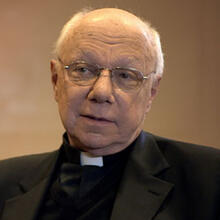In his new book The Next Pope, George Weigel seeks to create a profile of the next pope. The profile he establishes can be easily summarized: “not Pope Francis.” The book is a hardly subtle critique of the present bishop of Rome. In a brief 133 pages I counted at least 62 times when he used the verb “must” in regard to what the next pope should do.
Weigel bases his book on extended conversations with St. John Paul II, Pope Emeritus Benedict XVI and Pope Francis as well as on “many years of interaction with Catholics on every continent, living all stations of life in the Church.” He occasionally refers to the Second Vatican Council, whose documents, I should think, might shed light on desirable qualities for a modern pope. Those of us who have not met with multiple pontiffs must rely on the output of Vatican II, the papal magisterium since then, our own experience of the church and the “sensus fidelium” to guide our opinions about Francis’ successor.
George Weigel’s new book is a hardly subtle critique of the present bishop of Rome.
Weigel’s insider status seems to allow him to speak with magisterial authority, and in this small book he finds room to deliver his opinions on every aspect of church life. There is much to debate on many pages. I will confine myself to only a few of his pronouncements.
Weigel rightly emphasizes that the next pope must be fully committed to the new evangelization with Christ as its center. In countries where this is forgotten, he maintains, the church is dying. These countries are guilty of practicing what Weigel calls Catholic Lite and include most of Western Europe, North America, Latin America, Australia and New Zealand. They are not sufficiently focused on Christ, he believes. I think this would come as a surprise to the hundreds of thousands of bishops, priests and permanent deacons in every country of the world who work hard every week to help their people understand the words of Jesus in the Sunday Gospel and their application in daily life.
In his insistence on the centrality of Christ in the church, Weigel makes only passing reference to the crucified and risen Lord and no reference at all to the cross. This is a serious omission; the church stands under the cross for both judgment and salvation. And the cross also stands over against a world of massive greed and exploitation of peoples. The cross is ultimately the source of Christian solidarity with those who are most vulnerable and leads not only to works of charity but also to the church’s social doctrine for transforming unjust social structures. St. John Paul II was quite critical of those who by silence become complicit in systemic injustice. The next pope, I would say, must continue the development of Catholic social doctrine, which goes back to Leo XIII.
Weigel maintains that the church is dying in countries where the fullness of Catholic moral teaching is not being upheld.
Weigel maintains that the church is dying in countries where the fullness of Catholic moral teaching is not being upheld. In fact, the bishops of the United States have been strong in their defense of life from conception to natural death and the sanctity of marriage. Yet the pews continue to empty.
Weigel is particularly critical of Chapter VIII of “Amoris Laetitia,” which would allow some couples in irregular marriages to receive the sacraments, though with certain conditions. Rocco Buttiglione, an Italian philosopher who is one of the foremost interpreters of the thought of John Paul II, maintains that this chapter is quite consistent with the teaching of John Paul II and a legitimate development of it.
In a brief 133 pages I counted at least 62 times when Weigel used the verb “must” in regard to what the next pope should do.
Weigel is puzzled about the meaning of the term synodality. In John Paul II’s letter “Novo Millennio Ineunte,” issued at the end of the Jubilee Year 2000, he urged the strengthening of all the instruments of consultation in the church, especially insisting on listening to the young. That is synodality in practice. Also, the International Theological Commission, which is attached to the Congregation for the Doctrine of the Faith and is hardly an instance of what Weigel would call Catholic Lite, issued a lengthy study in 2018 calling for “the renewal of the synodal life of the church.” The study showed how deeply rooted synodality is in the history and theological tradition of the church.
Weigel is concerned about those who co-opt the papacy for their own agendas. Specific examples from recent decades would have been helpful. He is critical of the fixation on the papacy in the minds and imaginations of many Catholics. He might have named those who have contributed to that over the years.
I confess to being a regular reader of Weigel’s syndicated column, not because I share his perspective but because his writing gives me a window into the mindset of some Catholics who see mostly doom and little light in the church today. So often, because of their only partial historical and theological knowledge, they fail to see that the church is never static but always in motion, that the demands of the Gospel become clearer over time, that failure never means death but rather new forms of life.
I offer to the publisher of The Next Pope a proposal for another book, to be written, I sugggest, by the pastor of a large parish in the southwestern United States, where there are nine or 10 Masses each weekend in three or four languages, where there are many essential workers affected by the current crises, where there are many undocumented immigrants and many suffering households seeking to live the Gospel authentically. I suspect the profile of the next pope given by such a pastor would be quite different from the one proposed by George Weigel.










